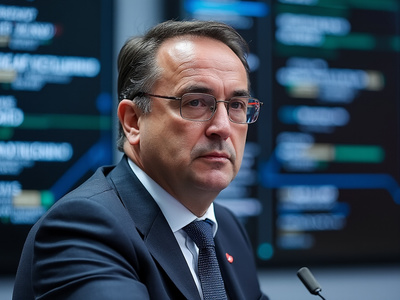
Spanish Government Approves €2 Billion Defense Budget Increase Amid Controversy
Political tensions arise as funding shift from social services to military spending ignites criticism from Podemos leaders.
On Tuesday, the Spanish Council of Ministers approved a credit transfer exceeding €2 billion for the Ministry of Defense.
This decision has sparked significant backlash from Irene Montero, the political secretary of Podemos and a Member of the European Parliament, who characterized the move as a "great robbery" of citizen resources.
Montero alleges that this funding shift effectively diverts money from pensions, healthcare, and education towards the acquisition of military equipment from the United States.
During her remarks, Montero expressed concern over the government's priorities, criticizing Prime Minister Pedro Sánchez for allowing such a transfer while claiming there was no available funding for social expenditures during Podemos’s time in government.
Montero referred to the increase in military spending as emblematic of a broader trend in the European Union, which has allocated more than €800 billion toward rearmament initiatives.
In an interview on La Hora de La 1 with TVE, Montero stated that the arms strategy represents a significant infringement on the public’s well-being.
She recounted a recent conversation with Finnish Prime Minister Petteri Orpo, in which Orpo noted that increasing defense spending often necessitated cuts to public services.
Montero asserted that Sánchez misleads the public when he claims that the rise in defense spending will not impact social policies, accusing the government of undermining the mandate given by the electorate.
The approved credit transfer amounts to €2.084 billion earmarked for defense, despite opposition from the ministerial party Sumar, which voted against the measure.
Multiple sources indicate that without new state budgets, existing programs, particularly those related to advanced weaponry, face potential financial challenges.
A significant portion of the allocated funds—approximately €1.673 billion—will be directed toward modernizing the armed forces, including upgrades to weapons systems, training, and the replenishing of equipment for the Army, Air Force, Space Force, and Navy.
Regarding the 20% tariffs imposed by former President Trump on Spain and the European Union, Montero advocated for the activation of Article 128 of the Spanish Constitution, which prioritizes national wealth for the public interest.
She proposed "exceptional measures" reminiscent of those implemented during the COVID-19 pandemic to safeguard the economy, including expropriating properties from large landlords and American hedge funds and exploring a departure from NATO.
Montero described the government’s recently announced €14.1 billion plan to mitigate the impact of US tariffs as insufficient, expressing concern over the direction of Spain's economic strategy in light of potential trade conflicts.
Addressing the unity of the left in Spain, Montero dismissed collaboration with Sumar, proposing instead the formation of a "peace" coalition with those opposing rearmament.
She urged Sumar to merge efforts with the Socialist Workers' Party (PSOE), insisting that both sides should advance the cause of peace, feminism, anti-racism, and anti-fascism while seeking to consolidate progressive forces across the political landscape.
This decision has sparked significant backlash from Irene Montero, the political secretary of Podemos and a Member of the European Parliament, who characterized the move as a "great robbery" of citizen resources.
Montero alleges that this funding shift effectively diverts money from pensions, healthcare, and education towards the acquisition of military equipment from the United States.
During her remarks, Montero expressed concern over the government's priorities, criticizing Prime Minister Pedro Sánchez for allowing such a transfer while claiming there was no available funding for social expenditures during Podemos’s time in government.
Montero referred to the increase in military spending as emblematic of a broader trend in the European Union, which has allocated more than €800 billion toward rearmament initiatives.
In an interview on La Hora de La 1 with TVE, Montero stated that the arms strategy represents a significant infringement on the public’s well-being.
She recounted a recent conversation with Finnish Prime Minister Petteri Orpo, in which Orpo noted that increasing defense spending often necessitated cuts to public services.
Montero asserted that Sánchez misleads the public when he claims that the rise in defense spending will not impact social policies, accusing the government of undermining the mandate given by the electorate.
The approved credit transfer amounts to €2.084 billion earmarked for defense, despite opposition from the ministerial party Sumar, which voted against the measure.
Multiple sources indicate that without new state budgets, existing programs, particularly those related to advanced weaponry, face potential financial challenges.
A significant portion of the allocated funds—approximately €1.673 billion—will be directed toward modernizing the armed forces, including upgrades to weapons systems, training, and the replenishing of equipment for the Army, Air Force, Space Force, and Navy.
Regarding the 20% tariffs imposed by former President Trump on Spain and the European Union, Montero advocated for the activation of Article 128 of the Spanish Constitution, which prioritizes national wealth for the public interest.
She proposed "exceptional measures" reminiscent of those implemented during the COVID-19 pandemic to safeguard the economy, including expropriating properties from large landlords and American hedge funds and exploring a departure from NATO.
Montero described the government’s recently announced €14.1 billion plan to mitigate the impact of US tariffs as insufficient, expressing concern over the direction of Spain's economic strategy in light of potential trade conflicts.
Addressing the unity of the left in Spain, Montero dismissed collaboration with Sumar, proposing instead the formation of a "peace" coalition with those opposing rearmament.
She urged Sumar to merge efforts with the Socialist Workers' Party (PSOE), insisting that both sides should advance the cause of peace, feminism, anti-racism, and anti-fascism while seeking to consolidate progressive forces across the political landscape.
Translation:
Translated by AI
AI Disclaimer: An advanced artificial intelligence (AI) system generated the content of this page on its own. This innovative technology conducts extensive research from a variety of reliable sources, performs rigorous fact-checking and verification, cleans up and balances biased or manipulated content, and presents a minimal factual summary that is just enough yet essential for you to function as an informed and educated citizen. Please keep in mind, however, that this system is an evolving technology, and as a result, the article may contain accidental inaccuracies or errors. We urge you to help us improve our site by reporting any inaccuracies you find using the "Contact Us" link at the bottom of this page. Your helpful feedback helps us improve our system and deliver more precise content. When you find an article of interest here, please look for the full and extensive coverage of this topic in traditional news sources, as they are written by professional journalists that we try to support, not replace. We appreciate your understanding and assistance.










